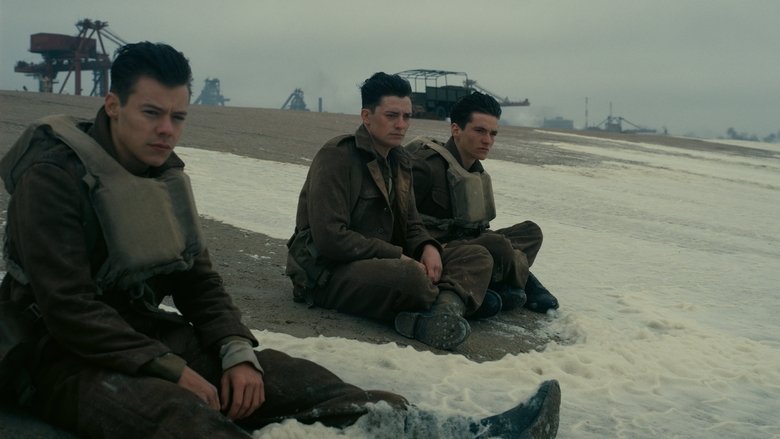← Back to Reviews

in
Based on the true story of British military forces being evacuated from the French port of Dunkirk in the face of German aggression during World War II.
It's amazing what difference the placement of a title card can make. Seeing Nolan break a pattern of smash-to-title endings by placing a characteristically stark-looking DUNKIRK at the beginning promises not only a change to form but also a sign of reverence in this foray into historical dramatisation. Its three intertwining narratives pay varying amounts of lip-service to this ideal, putting less emphasis on actively combating a constantly-obscured enemy than on surviving from one moment to the next. While Tom Hardy's fighter pilot and Mark Rylance's civilian boat captain both exude stiff-upper-lip courage in the face of whatever danger they're heading into, it's the mostly-unknown and nigh-indistinguishable young soldiers who just care about getting away from the danger as quickly as possible that prove a curious point of reference for the conflict. The characters' understandably high levels of fear may occasionally give way to acts of cowardice with tragic consequences, but they are never truly vilified in the process. The deliberate refusal to place too much emphasis on individual characters may reinforce the chaotic nature of the film, but it's constantly threatening to weigh down the film whenever it suddenly acts like it cares about the personal conflicts that arise between the characters.
In my experience, Hoyte van Hoytema hasn't proved a particularly impressive cinematographer (mainly because of the flat colour palettes I've noticed in other films he's lensed) and seeing his name attached to a film that promised as much visual spectacle as "must be seen in 70mm" Dunkirk did was enough to give me pause. Fortunately, this dullness feels at least somewhat appropriate when depicting the grim atmosphere on the war-torn beachfront, plus it's put to decent use in composing scenes ranging from claustrophobic interiors to intimidating bird's-eye views of the ocean. If anything, it's hampered by editing that is a little too quick on the draw at times in the name of maintaining a perpetually heightened sense of visceral discomfort at the proceedings (though I wouldn't necessarily categorise this discomfort as either suspenseful or thrilling). Hans Zimmer's score is similarly relentless, with the most memorable leitmotif sounding like the countdown noise from Predator. What this all builds up to is a film that comes across as distilled Nolan, for better and for worse. The overlapping timelines of all three sub-plots means that it plays out like an extended third act from one of his other films, whereas his decision to downplay characterisation and dialogue seems like an acknowledgement of his weaknesses as a screenwriter. Though it still leaves at least a little something to be desired when it comes to its already-remarkable craftsmanship, it's still a welcome change of pace that manages to stand out on its own.
DUNKIRK
Christopher Nolan, 2017

Christopher Nolan, 2017

Based on the true story of British military forces being evacuated from the French port of Dunkirk in the face of German aggression during World War II.
It's amazing what difference the placement of a title card can make. Seeing Nolan break a pattern of smash-to-title endings by placing a characteristically stark-looking DUNKIRK at the beginning promises not only a change to form but also a sign of reverence in this foray into historical dramatisation. Its three intertwining narratives pay varying amounts of lip-service to this ideal, putting less emphasis on actively combating a constantly-obscured enemy than on surviving from one moment to the next. While Tom Hardy's fighter pilot and Mark Rylance's civilian boat captain both exude stiff-upper-lip courage in the face of whatever danger they're heading into, it's the mostly-unknown and nigh-indistinguishable young soldiers who just care about getting away from the danger as quickly as possible that prove a curious point of reference for the conflict. The characters' understandably high levels of fear may occasionally give way to acts of cowardice with tragic consequences, but they are never truly vilified in the process. The deliberate refusal to place too much emphasis on individual characters may reinforce the chaotic nature of the film, but it's constantly threatening to weigh down the film whenever it suddenly acts like it cares about the personal conflicts that arise between the characters.
In my experience, Hoyte van Hoytema hasn't proved a particularly impressive cinematographer (mainly because of the flat colour palettes I've noticed in other films he's lensed) and seeing his name attached to a film that promised as much visual spectacle as "must be seen in 70mm" Dunkirk did was enough to give me pause. Fortunately, this dullness feels at least somewhat appropriate when depicting the grim atmosphere on the war-torn beachfront, plus it's put to decent use in composing scenes ranging from claustrophobic interiors to intimidating bird's-eye views of the ocean. If anything, it's hampered by editing that is a little too quick on the draw at times in the name of maintaining a perpetually heightened sense of visceral discomfort at the proceedings (though I wouldn't necessarily categorise this discomfort as either suspenseful or thrilling). Hans Zimmer's score is similarly relentless, with the most memorable leitmotif sounding like the countdown noise from Predator. What this all builds up to is a film that comes across as distilled Nolan, for better and for worse. The overlapping timelines of all three sub-plots means that it plays out like an extended third act from one of his other films, whereas his decision to downplay characterisation and dialogue seems like an acknowledgement of his weaknesses as a screenwriter. Though it still leaves at least a little something to be desired when it comes to its already-remarkable craftsmanship, it's still a welcome change of pace that manages to stand out on its own.
